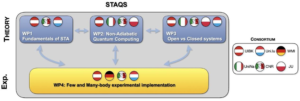STAQS
Shortcuts to Adiabaticity for Quantum Computation and Simulation
Adiabatic processes are at the core of countless experiments. They find numerous applications in quantum simulations and quantum computing that range from adiabatic pulse sequences generating quantum gates in superconducting platforms to the preparation of many-body states in cold atoms, to name just a few. At the same time, adiabatic state preparation itself constitutes a computational paradigm within adiabatic quantum computing. While the adiabatic theorem enables a variety of applications, it is also a source of fundamental limitations both in required timescales and restricting to ground/eigenstate conserving operations.
The project is located in the fundamental science domain but explores a novel concept as a seed for future technological implementations in adiabatic quantum simulation and computing. Its specific goal is to develop a comprehensive set of non-adiabatic building blocks that replace the adiabatic state preparation by non-adiabatic processes using shortcuts to adiabaticity (STA). This fundamentally new paradigm allows one to detach from the adiabatic limit, which currently hinders practical applications, by introducing additional unitary quantum operations to the system. In this promising approach, only early theory work and simplistic experiments exist so far.
In a joint effort of leading experimental and theory groups, the project will demonstrate the first two-body STA experiment with a scalable architecture, the first STA experiment with a non-scale-invariant system, a novel theoretical framework for STA of statistical ensembles and a novel tensor network framework for STA.
We expect a broad impact ranging from fundamental science experiments to applications in commercial quantum devices. Regarding the latter, the general demand for scalable and technologically feasible quantum optimization tools emphasized the disruptive character of STAQS.

Graphic: Experimental groups and Theory groups will work in close collaboration to develop and implement fundamentally new methods for short-cuts to adiabaticity.
CONSORTIUM
- Coordinator: Wolfgang Lechner (University Innsbruck, AT)
- Frank Deppe (Bayerische Akademie der Wissenschaften, DE)
- Procolo Lucignano (University of Napoli , IT)
- Giacomo Lamporesi (National Research Council, IT)
- Aurelia Chenu (University of Luxembourg, LU)
- Jacek Dziarmaga (Jagiellonian University, PL)
PROJECT POSTER: STAQS







